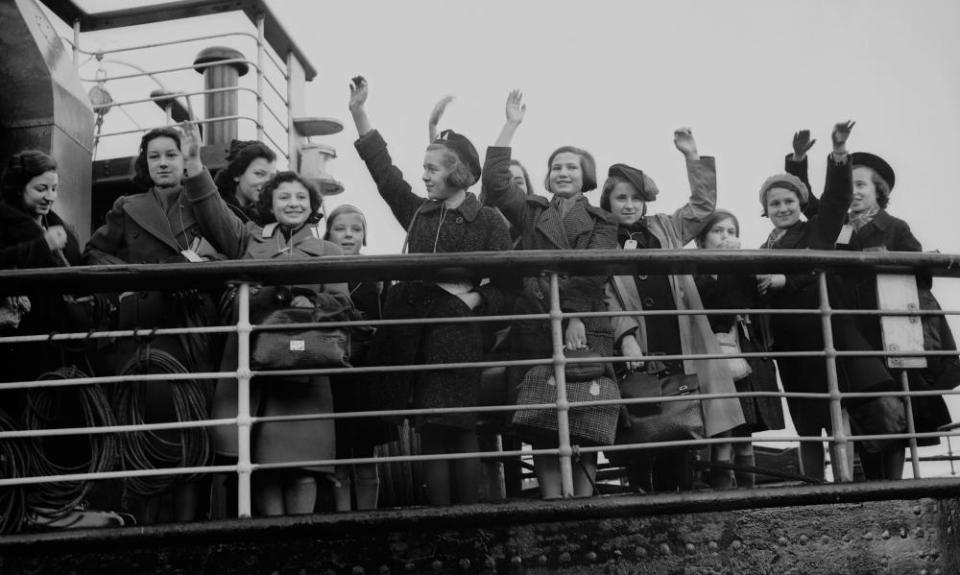Czechs urged to repeal law denying rights to Kindertransport descendants

The Czech government is coming under pressure to amend a communist-era rule that denies citizenship rights to descendants of Jewish refugee children who fled to Britain from Nazi-occupied Czechoslovakia on pre-second world war Kindertransports.
A law passed after the communists seized power in 1948 aimed to punish defectors who fled the dictatorship for the capitalist west by stripping them and any children they had afterwards of the right to citizenship, unless registered at a Czechoslovak embassy within a year of their birth.
Campaigners say the regulation – which applies to anyone of Czech parentage born between October 1949 and May 1969 – has had the unintended effect of barring citizenship rights for potentially thousands of children and grandchildren of young Jewish refugees who escaped Czechoslovakia thanks to the efforts of the British humanitarian aid worker Sir Nicholas Winton and other noted volunteers, including Doreen Warriner and Trevor Chadwick.
Between March and August 1939, eight trains evacuated a total of 669 mainly Jewish children from Prague to London, until the outbreak of war stopped the transports.
The cold war-era law punishing defectors for “unauthorised abandonment” of Czechoslovakia was abolished in 1990, the year after the communist regime was toppled in the Velvet Revolution.
Those forcibly deprived of citizenship have since had it restored, but the regulation barring unregistered children remains in effect.
A 2013 citizenship law granted those born in the 1949-69 period a year-long amnesty to submit applications but the Association of Jewish Refugees (AJR), a British-based charity for Holocaust refugees, says the vast majority of Kindertransport descendants knew nothing of the temporary window and remain excluded.
Officials say more than 500 people born to Czech parents successfully gained citizenship before the amnesty expired in January 2015.
The association is now pressing the government of Petr Fiala, the Czech prime minister, to adopt an amendment tabled nearly two years ago by an MP, Karla Šlechtová, that would grant a new five-year amnesty for unregistered applicants.
The amendment stalled after the 2021 general election that brought Fiala’s coalition administration to power and has been further stymied by the new government’s focus on Russia’s invasion of Ukraine.
Amid growing frustration, the UK government’s special envoy for post-Holocaust affairs, Lord Pickles, recently wrote to his Czech counterpart, Robert Řehák, urging that matters be accelerated by tacking the amendment on to unrelated legislation, such as the government-sponsored finance bill.
The AJR has enlisted the support of Czech Jewish groups to bolster a lobbying effort aimed at overcoming what it perceives as a lack of political will. “There is much sympathy,” said Michael Newman, the organisation’s chief executive. “There is also the text of a law and the intention to promulgate but no timeline when. This is what is frustrating.”
The restrictions contrast with recent descendants’ citizenship rights extensions in Austria and Germany, where the offspring of Jews in or displaced from the Sudetenland at the time of its annexation by Hitler from Czechoslovakia in 1938 are able claim German citizenship, even while they are ineligible for Czech nationality.
Aspiring applicants invoke emotional ties to their parents’ or grandparents’ birthplace, but some also express a desire to restore EU rights lost due to Brexit.
Naomi Yandell, 61, who lives in Cambridge, had her citizenship application rejected despite having been invited to a ceremony at the Czech embassy in London to unveil a portrait of Winton, who was awarded the Czech Republic’s highest honour before his death in 2015.
She was inspired to apply by the story of her late father, George Fuller (originally Fuchs), who was sent to Britain in May 1939, at the age of eight, by his parents, who later perished at Treblinka.
“I was born in 1961, the daughter of a Czechoslovak citizen,” she said. “I am sad that my children and I no longer appear to have an opportunity to claim Czech citizenship, given my family’s deep roots with the country over many generations. It seems most unjust.”
David Lowy, 56, who lives in Vancouver, said he was denied citizenship despite his father, Otto, having served in the Czechoslovak squadron of the RAF after fleeing Prague as a 17-year-old. Otto later emigrated to Canada, where he became a broadcaster noted for his programmes on Czech history and culture.
“I want this because I’m Czech – it’s the environment I grew up in,” said Lowy, who holds Canadian and British citizenship. “Those Kindertransport children were Czechs who were got out as nine or 10-year-olds by Nicholas Winton, who is one of the most honoured people in the Czech Republic. Yet their own children, born 20 years later, cannot become Czechs – it’s terrible.”

 Yahoo Movies
Yahoo Movies 